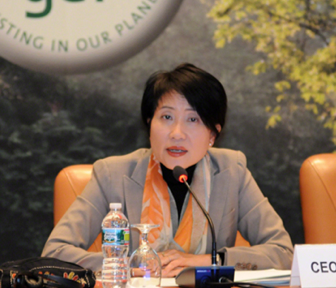Among the climate change projects in the Work Program approved by the 43rd Meeting of the Global Environment Facility (GEF) Council were projects on geothermal in Djibouti, photovoltaics in Iraq, energy efficiency in Macedonia and Sierra Leone, and waste-to-energy in Tanzania.
 15 November 2012: The 43rd Meeting of the Global Environment Facility (GEF) Council adopted a Work Program that amounts to US$174 million and aims to benefit 63 countries.
15 November 2012: The 43rd Meeting of the Global Environment Facility (GEF) Council adopted a Work Program that amounts to US$174 million and aims to benefit 63 countries.
The Council convened in Washington, DC, US, from 13-15 November 2012, at International Monetary Fund (IMF) headquarters. Representatives of governments, international organizations and civil society organizations (CSOs) attended the three-day meeting, which also included the 13th meeting of the Council for the Least Developed Countries Fund (LDCF) and Special Climate Change Fund (SCCF). The meetings were preceded by consultations with CSOs on 12 November.
A keynote address by Francisco Gaetani, Vice-Minister of Environment, Brazil, helped set the stage for a discussion on the long-term vision for the GEF. Aram Harutyunyan, Minister of Nature Protection, Armenia, and Rachel Kyte, Vice President for Sustainable Development, World Bank, also contributed remarks to frame this discussion. The Council also heard messages from Scientific and Technical Advisory Panel (STAP) Chair Thomas Lovejoy, the Convention on Biological Diversity (CBD) Executive Secretary Braulio Ferreira de Souza Dias and Jim Willis, Executive Secretary for the Basel, Rotterdam and Stockholm Conventions.
The Council approved decisions on: briefing on the replenishment process; relations with conventions and other international institutions; proposed framework for a financial mechanism for the future mercury convention and draft operational program for mercury; the progress report from the Director of the GEF Evaluation Office; the annual thematic evaluations report 2012 and management response; the annual impact report 2012 and management response; the annual monitoring review; streamlining of the project cycle; financial projections for GEF-5 programming options; the report of the selection and review committee; and the Work Program.
Half of the 10 climate change projects and programs in the approved Work Program are focused on energy: Geothermal Power Generation Program in Djibouti (World Bank); Catalyzing the Use of Solar Photovoltaic Energy in Iraq (UNDP); Catalyzing Market Transformation for Industrial Energy Efficiency and Accelerate Investments in Best Available Practices and Technologies in the Former Yugoslav Republic of Macedonia (UNIDO); Energy Efficient Production and Utilization of Charcoal through Innovative Technologies and Private Sector Involvement in Sierra Leone (UNDP); and Promotion of Waste-to-Energy Applications in Agro-industries in Tanzania (UNIDO).
The LDCF/SCCF Council convened for its 13th meeting on 15 November, and adopted, inter alia, a Work Program that amounts to US$28.544 million for the SCCF and US$1.87 million for the LDCF. Belgium, Finland, the Netherlands, Norway and Sweden announced new contributions to the LDCF and SCCF amounting to US$80.8 million.
Also on 15 November, the LDCF/SCCF and GEF Councils reviewed and approved the Joint Summary of the Chairs of the respective meetings. A Council member stressed that highlights of the meeting should indicate that the Council expressed its appreciation to the new CEO, Naoko Ishii, for her efforts to engage the Council and to renew the partnership on which the GEF was built, and that the Council found the Work Program to be well balanced, with projects that were innovative and scalable.
Ishii said the meeting accomplished the three goals she identified at its opening: think of the future of the GEF; begin a new way of doing business to strengthen partnerships; and ensure that resources are effectively managed. The GEF 2020 visioning exercise had been a highlight, she noted. [IISD RS Meeting Coverage]